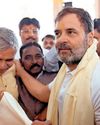
On May 18, 1974, India conducted a Peaceful Nuclear Explosion at Pokhran. Almost a quarter century later, it conducted five nuclear tests of advanced weapon designs, once again at the Pokhran range, catapulting the country into the nuclear club with the ability to weaponise and maintain a nuclear arsenal.
The process of weaponisation and operationalisation was not smooth. Because of the need to maintain secrecy and also because of the long gap between the first and the second tests, the military was kept out of the loop for a long time. Even before the 1998 tests, General K. Sundarji (retd), former Army chief, had written that the "really big secret is that India has no coherent nuclear weapon policy and worse still, she does not have an institutionalised system for analysing and throwing up policy options in this regard".
Despite the obvious disadvantage in keeping the programme outside the military, India had to move fast to operationalise its nuclear deterrent as pressure was building up from various quarters. Post the tests, India faced sanctions and there was pressure to roll back the nuclear programme and sign the CTBT (Comprehensive Nuclear-Test-Ban Treaty). The UN Security Council adopted Resolution 1172 condemning the tests. India stood firm and released its Draft Nuclear Doctrine (DND) in August 1999, showcasing itself as a responsible nuclear power.
Denne historien er fra June 09, 2024-utgaven av THE WEEK India.
Start din 7-dagers gratis prøveperiode på Magzter GOLD for å få tilgang til tusenvis av utvalgte premiumhistorier og 9000+ magasiner og aviser.
Allerede abonnent ? Logg på
Denne historien er fra June 09, 2024-utgaven av THE WEEK India.
Start din 7-dagers gratis prøveperiode på Magzter GOLD for å få tilgang til tusenvis av utvalgte premiumhistorier og 9000+ magasiner og aviser.
Allerede abonnent? Logg på

Use multi-asset investing to overcome portfolio volatility
EQUITY MARKETS have been choppy during this year. After rallying for the better part of the first nine months of 2024, equities corrected sharply in October and November, before taking off once again on rally mode in December.

Twist of faith
Upamanyu Chatterjee is back with his wry sense of humour in his new novel, and most of it is directed at religion and spirituality

THE GLORY OF SARI
Saris of Memory weaves together history and textiles, highlighting key moments from the author's collection

We win together
We invented chess, which was pretty cool of us. The original game 'chaturanga'that is four divisions (infantry, cavalry, elephantry and chariotry)-was a war strategy game. When the game travelled to the Middle East, they mangled the Sanskrit and it ended up being called 'shatranj' instead.

BEATS THAT HEAL
Music ignites the light within us, says Grammy-winner Chandrika Tandon

Older, smarter, sexier
Those who worship him regardless of where he works have continued to do so. Such is the power of Alessandro Michele, that after being the face of some mega brands for 10 years (namely Gucci and now Valentino), he remains bigger than the labels themselves. His debut collection for Valentino was presented at the recent Paris Haute Couture Week, and it has been adored by his adorers.

The road to peace
Future political dialogues should explore means of ensuring a more robust autonomy to tribal communities

Diary of a Sherpa
Amitabh Kant's new book is a comprehensive account of the G20 Summit held in Delhi in 2023

The annoying orange
Everything is great. All is sunshine. I am an eternal optimist.\" It's the fad of our TikTok times everything is not great, the sun sets daily, nothing is eternal. If anything, everything is ephemeral, night brings darkness, and optimism often crumbles under the weight of history. British philosopher Roger Scruton warned: \"Hope untempered by the evidence of history is a dangerous asset, one that threatens not only those who embrace it, but all those within range of their illusions.\"

NO SEAT, YET UPBEAT
The Congress is buoyed by its increased vote share in Delhi, and feels it can push the AAP into further decline